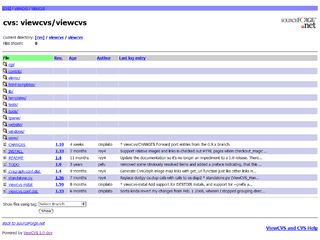The Artistic License is a software license used for certain free and open-source software packages, most notably the standard implementation of the Perl programming language and most CPAN modules, which are dual-licensed under the Artistic License and the GNU General Public License (GPL).

Bugzilla is a web-based general-purpose bugtracker and testing tool originally developed and used by the Mozilla project, and licensed under the Mozilla Public License.
GNOME System Tools (GST), previously known as Ximian Setup Tools and Helix Setup Tools, is a set of configuration programs for Linux and other Unix-like operating systems. It consists of a set of 'backends' which manipulate the system's configuration files, and generate XML descriptions of the current state, and frontends, generally written in C, which are GUIs for the GNOME desktop environment.

ViewVC is an open-source tool for viewing the contents of CVS and SVN repositories using a web browser. It allows looking at specific revisions of files as well as side-by-side diffs of different revisions. It is written in Python and the view parameters can be modified directly in a URL using a REST style interface.
Multi-licensing is the practice of distributing software under two or more different sets of terms and conditions. This may mean multiple different software licenses or sets of licenses. Prefixes may be used to indicate the number of licenses used, e.g. dual-licensed for software licensed under two different licenses.
Open-source software development is the process by which open-source software, or similar software whose source code is publicly available, is developed by an open-source software project. These are software products available with its source code under an open-source license to study, change, and improve its design. Examples of some popular open-source software products are Mozilla Firefox, Google Chromium, Android, LibreOffice and the VLC media player. Open-source software development has been a large part of the creation of the World Wide Web as we know it, with Tim Berners-Lee contributing his HTML code development as the original platform upon which the internet is now built.
The CVSNT Versioning System implements a version control system: it keeps track of all changes in a set of files, typically the implementation of a software project, and allows several developers to collaborate. It is compatible with and originally based on Concurrent Versions System (CVS), which has become popular in the open-source world.
LXR Cross Referencer, usually known as LXR, is a general-purpose source code indexer and cross-referencer that provides web-based browsing of source code, with links to the definition and usage of any identifier.

Komodo Edit is a free text editor for dynamic programming languages. It was introduced in January 2007 to complement ActiveState's commercial Komodo IDE. As of version 4.3, Komodo Edit is built atop the Open Komodo project.
In 2006, a branding issue developed when Mike Connor, representing the Mozilla Corporation, requested that the Debian Project comply with Mozilla standards for use of the Thunderbird trademark when redistributing the Thunderbird software. At issue were modifications not approved by the Mozilla Foundation, when the name for the software remained the same.
License compatibility is a legal framework that allows for pieces of software with different software licenses to be distributed together. The need for such a framework arises because the different licenses can contain contradictory requirements, rendering it impossible to legally combine source code from separately-licensed software in order to create and publish a new program.
The following outline is provided as an overview of and topical guide to free software and the free software movement:
The following outline is provided as an overview of and topical guide to the Perl programming language:
A free license or open license is a license agreement which contains provisions that allow other individuals to reuse another creator's work, giving them four major freedoms. Without a special license, these uses are normally prohibited by copyright law or commercial license. Most free licenses are worldwide, royalty-free, non-exclusive, and perpetual. Free licenses are often the basis of crowdsourcing and crowdfunding projects.

Tara Hernandez is a professional software developer, and veteran open source contributor. As shown in the documentary Code Rush, she was the manager of Netscape Navigator development at Netscape Communications Corporations, and worked on the preparation of the original Mozilla code for public release, which led to the development of the Firefox browser. She has also worked as a Release Team Manager at Blue Martini software, Senior Infrastructure Engineer and Team Lead at Pixar Animation Studios, Senior Engineering Manager at Lithium Technologies, and currently works as the Senior Director of Systems and Build Engineering at Linden Lab.






